All the best things about summer – barbies, picnics, sitting out in the garden around a fire pit, or enjoying a morning coffee on the patio – can quickly be ruined by an infestation of whining, biting mosquitoes!
Here are some tips for getting rid of mosquitoes and preventing them from coming back, as well as reviews of the best mosquito traps and mosquito zappers that help keep these pests at bay.
More...
Ways For Getting Rid of Mosquitoes

Prevent Stagnant Pools of Water
Still pools of water on the ground, in open rain collection systems, or in ponds and water features are a breeding ground for mosquitoes. In fact, still and murky water is their dream home.
Thousands of them can breed in surprisingly small amounts of water, so it’s absolutely essential that you get rid of it before they settle in.
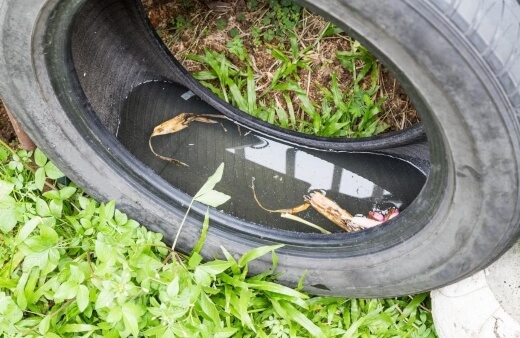
To solve this issue, you can:
- Install a small solar water fountain – A small fountain will help keep water in ponds, bird baths, and water features moving. This will prevent mosquitoes from breeding in this water.
A simple solar water fountain like this one is eco-friendly, easy to install into almost any small body of water, and has a battery that keeps the fountain running through the night. - Close rainwater collection systems – Collecting rainwater is a fantastic way to save water and keep your garden growing, but it needs to be a sealed rainwater collection system if you want to prevent mosquitoes from moving in.
Luckily, these tanks are affordable, fairly attractive, and easy to install, collecting rainwater from your guttering and downpipes. - Don’t overwater your garden – In addition to breeding in pools of water, mosquitoes tend to gather and breed in damp soil, especially in dense undergrowth.
To help prevent this, water only when your garden needs it, and try to water in the early morning rather than the evening, so the soil is dry through the night-time breeding period.
It’s also a good idea to keep flowerbeds clear of dense undergrowth and to plant native species, as they tend to be much more drought resistant.
Pools should not be a problem, as long as they are well-maintained. The chlorine or salt content in a swimming pool helps in keeping mosquitoes away.
Make Use of Everyday, Mosquito Repellent Household Items

Most people don’t know that their homes actually hold a lot of everyday items that can keep mosquitoes at bay. A tasty tip is to just cook with a lot of garlic!
This will help drive them out of your kitchen or patio area and deter them from biting you. Just like their blood-sucking, fictional relative- mosquitoes can’t stand garlic. Find out how to grow your own garlic at home.
Neem Oil, Coconut oil and even Listerine are also great mosquito deterrents.
Get a Bug Zapper/Electric Mosquito Repeller
Like other bugs, mosquitoes are attracted to light, so placing a bug zapper on your patio or deck is a great way to draw mosquitoes away from you and get rid of them.
The UV light they emit attracts mosquitoes, flies, moths, and other bugs, and as they land on the light, they are electrocuted on a wire mesh that surrounds the lightbulb.
We recommend the following products if you are looking for a good-quality bug zapper:
Best Electric Mosquito Zapper
1. Faicuk 2-Pack Electric Fly Swatter Mosquito Killer
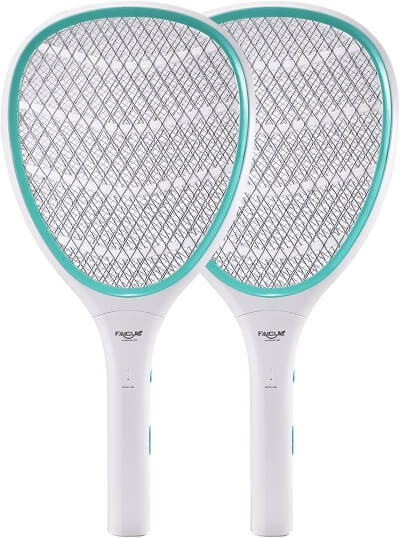
If you’re looking for ultimate affordability and portability - and to practice your forehand serve - then this bug zapper may be more your style.
The racket-shaped bug zapper has a 3000V output and uses two AA batteries to supply the charge. Simply aim it at any flying pest and activate the zap button to get rid of mosquitoes, flies, and other flying pests.
This high-quality 2-pack of portable zappers is useful for home use or camping and requires more active use than the zappers that use UV lighting to attract bugs.
2. BLACK + DECKER Bug Zapper and Mosquito Repellent
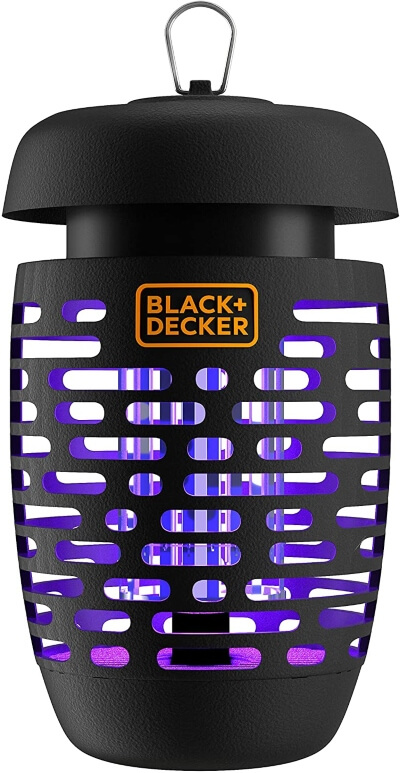
This stylish, compact mosquito trap attracts wasps, mosquitoes, and other flying pests by drawing them in with UV light. It covers a smaller area of around 60 square metres, making it better for patio use or indoor use.
It works day or night, and is clog-resistant – working on all types of bugs while still keeping it safe for use around kids and pets.
Install Mosquito Traps
Mosquito traps aren’t quite as effective as the bug zappers, but they will still give you some level of protection. They’re recommended if you tend to have problems with other flying pests as well as mosquitoes, like fruit flies, house flies, and wasps.


Get Your Free Guide:
Master Growing Australian Natives eBook
A Must Have Complete Guide for Every Australian Garden
Get Your Free Guide:
Master Growing Australian Natives eBook
A Must Have Complete Guide for Every Australian Garden
Best Mosquito Trap Reviews
We are currently reviewing new models and will update this post shortly.
A Note on Mosquito Repellent Plugs
Mosquito repellent plugs are supposed to work by emitting a sound frequency that is too high for the human ear but repels mosquitoes and other insects.
While there are many of these devices on the market, the science doesn’t quite back up the method, so we recommend using tried-and-tested solutions instead.
Natural Mosquito Repellent
If you prefer the natural route, there are some great organic and eco-friendly sprays, candles, and infused wristbands on the market. Citronella oil is one of the key ingredients in these products, and ingredients like rosemary, lavender, and lemon can also help repel these pests.
They’re a great choice for eco-friendly families, for children with sensitive skin, and for using in conjunction with bug zappers. We like:
Best Natural Mosquito Repellents
3. Mosquito Guard Repellent Tea Light Candles
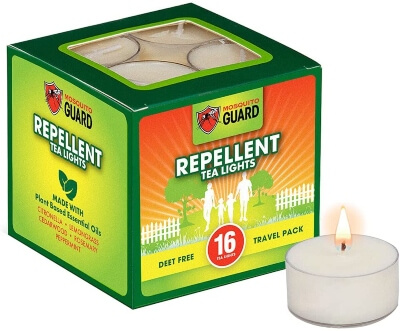
4. Mosquito Repellent Incense Sticks
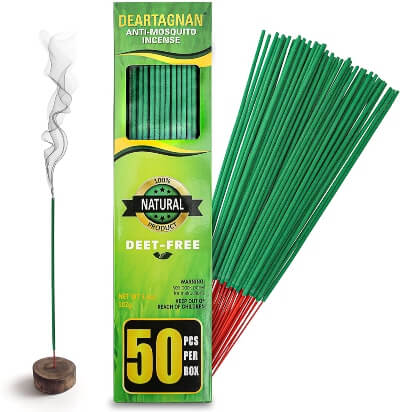
5. Mambino Organics Anti-Bug Mosquito Repellent Spray

Remember to apply sprays and creams liberally to exposed skin in the early evening and reapply after swimming or before you go to bed.
Plant a Bug Repellent Garden
Pests like flies and mosquitoes respond to chemicals in the air as well as light and carbon dioxide, so incorporating plants that release repellent scents into the air is a great way to make your garden less welcoming to these pests.
Good plants for keeping all kinds of bugs (not including bees) away include:
Keep Air Circulating
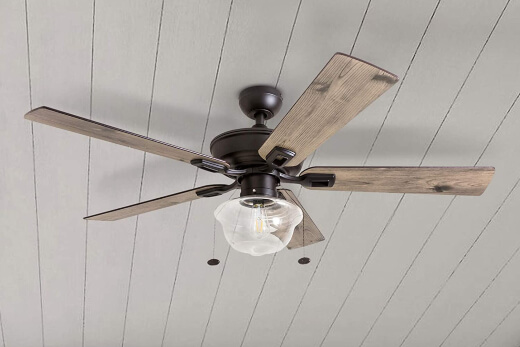
Source: Amazon
Mosquitoes like calm air as much as they like calm water, so keeping the air moving through the evening will disrupt their flight and send them away to find easier targets.
One easy way to do this is to install a ceiling fan on your patio or to use a standing fan in your room. This will also help disperse carbon dioxide, making it more difficult for mosquitoes to sense you, and fill the air with scent from citronella candles, repelling them even further.
Keeping Mosquitoes Out of Your Rain Barrels
As rain barrels become an important part of the garden landscape it can only be expected that they will become magnets for water-loving mosquitoes. In fact, with the phenomenal growth of rain barrels it should signal a disturbing trend that the mosquito population is set to explode.
Mosquitoes love any body of water that remains still long enough for them to release their larvae. Therefore it can only be expected that rain barrels will become a soft target for these pests to multiply.
The water collects from your roof via downpipes and is then stored in these water drums to be used at a time that is most probably not regular. This source of water then becomes the best possible breeding ground a mosquito could wish for.
So, how can rain barrels and water storage exist without creating a habitat for man’s most deadly insect? Easy…here’s some gardening tips that should keep them out of your water storage drums forever.
- Add a goldfish – small goldfish love mosquito larvae almost as much as we love chocolate. So why not add one, perhaps two, to each rain barrel. Provided they still have enough air – in other words don’t lock off the top of the barrel – keeping a goldfish in your drums should be quite a simple task.
The benefit is twofold; 1). the fish will devour the larvae as soon as they are laid, reducing your fish feeding bill, and 2). The ammonia excreted from the fish will produce beneficial nitrogen for your soil. - Produce an oil slick – we all saw how effective the Exxon Valdez spill was at killing wildlife, well the same principle applies here. Providing the water level in your rain barrels can be kept above the output spouts you can pour a layer of oil (preferably food-grade) on top of the water.
This acts as a shield for insects getting into your barrels and laying their eggs plus if any eggs do survive they will soon die once they begin to develop into the larvae stage.One important note, don’t combine this method of mosquito control with the one above. The oil slick will stop the water being aerated and the fish will eventually die. - Cover the intake with a filter – if the other two methods seem a little too bizarre for your liking then covering the intake is possibly the next best thing. A pair of nylon pantyhose should do the trick as they are fine enough to stop mosquito infestations but will still allow the water to seep through and collect in the barrels.
The downside of this method is that the filter will need to be checked often to ensure that they aren’t breaking down or that holes aren’t being produced. Even the smallest hole in these can become an access point for mosquitoes and their larvae. - Chemical larvicides – microbial larvicides are a chemical solution to the problem. If the three options listed above don’t seem to deal with your problem, or if you’re looking for an easy fix, then larvicides may be your next best option.
Granular forms are most likely to be available at your local hardware or garden store and should be added as per the directions at times when mosquito activity is at its peak.
As with most chemical solutions it is only a matter of time until mosquitoes build up an immunity to these and they become ineffective or stronger. My advice would be to only use these if you can’t find any resolution with the other ideas. - Mosquito Dunks – these are just a glorified form of larvicide making insertion easier for the user. They perform the same result as the method listed above but are more convenient in their packaging.
Hopefully one of these methods will work for your situation and help control mosquitoes breeding in your rain barrels.
Getting Rid of Mosquitoes FAQs
How do I permanently get rid of mosquitoes?
The best way to permanently get rid of mosquitoes in the garden is to remove any standing water or oxygenated ponds. Pondlife like frogs and tadpoles, or dragonflies and damselfly nymphs will eat mosquito larvae before it has a chance to hatch and are more likely to live happily in well-oxygenated ponds. Standing water like water butts should be covered to stop egg laying.
What kills mosquitoes the best naturally?
Neem oil will instantly kill mosquitoes, but it’s impossible and unsafe to use neem oil as a fog or spray. Electric mosquito traps are the only surefire way to kill mosquitoes on contact, safely, but there are tons of natural deterrents that help to prevent mosquitoes in the first place.
Do citronella candles really work?
Citronella candles can repel mosquitoes, but like any insect repellent, it's all about how desperate and determined those pesky flies really are. If you’ve got a stunning BBQ on the go, and there are flies swarming you, there’s no way a standard citronella candle will do the trick, but for a quiet evening in the garden, citronella candles work to keep them away from you.
What is the easiest way to repel mosquitoes?
Organic mosquito sprays are the best way to repel mosquitoes and don’t cause skin irritation as long as you’re not allergic to specific ingredients. Use menthol, citronella, or eucalyptus-based sprays for an organic way to keep from being bitten.
What's the best mosquito repellent?
The best mosquito repellent is always nature – plant eucalyptus, lavender, or rosemary around the patio, and keep pots full of peppermint growing on the dining table all year round.
Creating a natural mosquito-repelling garden is the best way to deter mosquitos in the long run.
What are mosquitoes afraid of?
Mosquitoes hate strong acidic odours, so any plants heavy in essential oils will keep mosquitoes away. While I’m sure mosquitoes are afraid of spiders, they’re not exactly the cleverest creatures on God’s green earth, so no amount of fear is going to keep them away. Stick to organic scents!
What are mosquitoes attracted to?
Mosquitoes appear to be more attracted to dark-coloured clothing than light fabrics and are attracted to the warm carbon dioxide humans breathe out, as well as particularly odours and pheromones emitted by some people – which is why some people are bitten more than others.
What happens when a mosquito bites you?
When a mosquito bites you, it pierces the skin using its piercing mouthparts and sucks up blood. In most cases, this will cause a very small red dot that may be itchy for a few minutes.
In some people, this can cause severe allergic reactions or ongoing itching and swollen bites. In rare cases, mosquitoes transmit diseases from person to person, but this is rare in Australia.
What is the best natural mosquito repellent?
Lemon and eucalyptus seem to be the most effective mosquito repellents on test, which makes sense as they have some of the strongest acidic fragrances, with longer lasting effects than most other herbal remedies.
Do electric mosquito repellents work?
Electric mosquito repellents do appear, anecdotally, to work, but most scientific trials have resulted in failures, so they are not strictly recommended as mosquito repellents. Rather than using ultrasound to deter mosquitoes, consider plug in bug zappers.
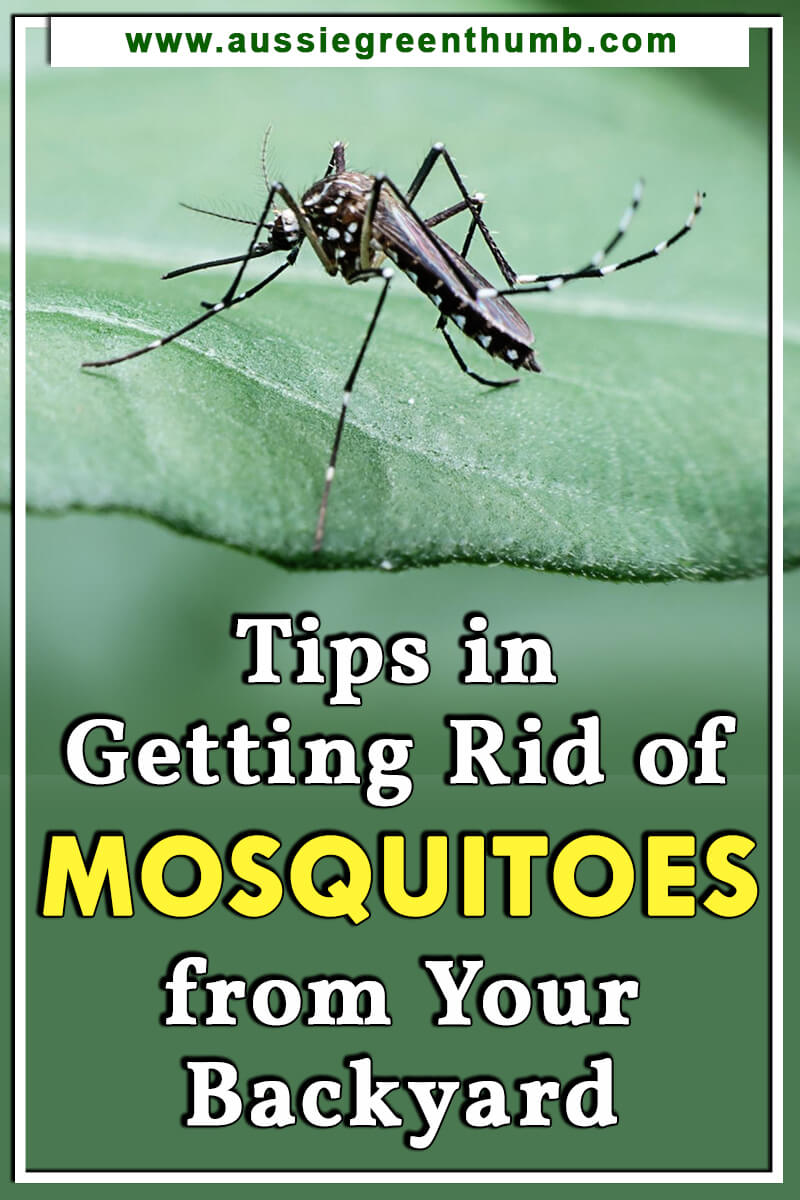
Start Getting Rid of Mosquitoes Your Garden!
Getting rid of mosquitoes is no easy task, but there are some effective ways of reducing their numbers and preventing those itchy bites. Investing in a good quality bug zapper, planting bug repellent plants, and using scent repellents like citronella will help you stay bite-free.
Just remember to do whatever you can to eliminate standing water and keep the air moving, and you’ll help eliminate the areas of your garden that can become breeding grounds for these pests.
We hope our tips have helped you get rid of mosquitoes for good!
Published on December 25, 2022 by Gary Clarke
Last Updated on December 23, 2025




